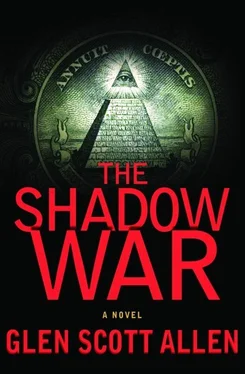Glen Allen - The shadow war
Здесь есть возможность читать онлайн «Glen Allen - The shadow war» весь текст электронной книги совершенно бесплатно (целиком полную версию без сокращений). В некоторых случаях можно слушать аудио, скачать через торрент в формате fb2 и присутствует краткое содержание. Жанр: Триллер, на английском языке. Описание произведения, (предисловие) а так же отзывы посетителей доступны на портале библиотеки ЛибКат.
- Название:The shadow war
- Автор:
- Жанр:
- Год:неизвестен
- ISBN:нет данных
- Рейтинг книги:5 / 5. Голосов: 1
-
Избранное:Добавить в избранное
- Отзывы:
-
Ваша оценка:
- 100
- 1
- 2
- 3
- 4
- 5
The shadow war: краткое содержание, описание и аннотация
Предлагаем к чтению аннотацию, описание, краткое содержание или предисловие (зависит от того, что написал сам автор книги «The shadow war»). Если вы не нашли необходимую информацию о книге — напишите в комментариях, мы постараемся отыскать её.
The shadow war — читать онлайн бесплатно полную книгу (весь текст) целиком
Ниже представлен текст книги, разбитый по страницам. Система сохранения места последней прочитанной страницы, позволяет с удобством читать онлайн бесплатно книгу «The shadow war», без необходимости каждый раз заново искать на чём Вы остановились. Поставьте закладку, и сможете в любой момент перейти на страницу, на которой закончили чтение.
Интервал:
Закладка:
"For godssake, Benjamin," Wolfe interrupted him, "stop being the historian for a moment and just tell me why this Newburgh-whatever is important."
"Well," said Benjamin, "it might be important because it was almost the only military coup ever attempted against the United States government."
" Coup?" replied Wolfe in surprise. "You must be joking. There's never been a coup against the U.S. government."
"I said almost, " corrected Benjamin.
And then Benjamin told Wolfe the story of the infamous-and for many years utterly secret-Newburgh Conspiracy of 1783, when the United States of America almost fell before it ever existed.
General George Washington, Commander in Chief of the Continental Army, was miserable.
He was cold. The winter of 1783 was proving to be as bad if not worse than that of 1782. The small hut that served as his headquarters in the camp at New Windsor was little more than a log cabin, and the bitter New York wind entered through a hundred chinks. And this was a windy March, indeed.
He was in pain. The latest set of wooden false teeth fit poorly, stretching his jaw and forcing him to at all times grit his teeth, as though in the extremity of rigor mortis.
He was downcast. Before him on the small rickety wooden table lay two letters: the first was from Superintendent of Finance Robert Morris in the Continental Congress, expressing in polite if adamant terms that there simply was no money in the treasury to pay his freezing, hungry soldiers; just as there'd been no money last month, or the month before.
The other letter was from Thomas Jefferson, appointed but not yet seated in the Congress, and therefore, to Washington's mind, a reliable observer of events there. He complained that the Treaty of Paris with the British had still not been ratified by the squabbling Congress, and that the young Articles of Confederation government was proving just as fragile and powerless as they'd feared it would be: unable to agree on even raising taxes to pay its army, and locked in bitter argument over a fundamental issue of their new government that Washington believed was the heart of everything they'd fought and suffered for: the principle of "one man, one vote." Jefferson wrote that the aristocratic members, like Hamilton, were fiercely and apparently unmovably against surrendering any of their power to what they called "rule by ignorant mob." It more than made the general angry; it was disheartening in the extreme to think that some of the rebels and patriots who had been most passionate about independence and democracy in the beginning of the fight did not, when the crucial time came, actually believe in either.
Thus, on the verge of victory and after seven years of bitter struggle for independence, all his dreams for the new Republic seemed to be unraveling.
At that moment there came a knock at the door.
"Yes," he said, not raising his head.
The tall, lanky figure of his longtime aide-de-camp, Lieutenant Colonel Tench Tilghman, entered the room. He strode to the table and threw a parchment down in front of Washington.
"Have you seen this?" he said, barely able to contain his anger.
Washington picked up the parchment. It was a letter, addressed to "All good and patriotic soldiers of the Continental Army, fellow sufferers at the hands of an indifferent and feckless Congress." He read the opening paragraph. Have you not more than once suggested your wishes, and made known your wants to Congress, wants and wishes, which gratitude and policy should have anticipated rather than evaded? And, have you not lately, in the weak language of entreating memorials, begged from their justice, what you could no longer expect from their favor?
"What is this?" Washington asked, not looking up from the paper.
"This… perfidy was distributed in the camp this very morning," Tilghman said through tight lips. "Read on."
Washington continued reading. Can you then consent to be the only sufferers by this revolution and, retiring from the field, grow old in poverty, wretchedness and contempt? Can you consent to wade through the vile mire of dependency and owe the miserable remnant of that life to charity, which hitherto has been in honor? If you can, go, and carry with you the jest of tories and the scorn of whigs; the ridicule and, what is worse, the pity of the world!
Go, starve and be forgotten! But, if your spirits should revolt at this; if you have sense enough to discover and spirit sufficient to oppose tyranny under whatever garb it may assume, whether it be the plain coat of republicanism or the splendid robe of royalty; if you have yet learned to discriminate between a people and a cause, between men and principles: awake, attend to your situation, and redress yourselves! If the present moment be lost, every future effort is in vain, and your threats then will be as empty as your entreaties now.
Now Washington looked up, his eyes heavy and sad.
"It's an incitement to treason, " Tilghman said. "They're calling for a meeting of all officers tomorrow, in the temple. They mean to march on Philadelphia, demand their blood money, and, if frustrated in that claim, disband the government and replace it with a military tribunal." He leaned forward, his hands on the table. "And we know who's scheming hand puts these words to paper."
"Gates," Washington said, with a sigh.
Tilghman nodded vigorously. "He has been hungry for your commission since the war began, we both know this. And he has been hard lobbying at Congress to replace you. Even after his marathon retreat, better to call it flight, from Cornwallis at Camden, he has Hamilton's favor. He sees final power in this maneuver."
"But what proof-," Washington began to protest, though weakly.
"Look at the letters!" Tilghman answered. "If that isn't the imprint of the press in Gates's quarters, I'm an English bulldog. And these sentiments, they're the constant cry of his aide, that artillery man with lead shot for brains, Armstrong."
Washington leaned back, ran a hand through his hair-hair that had once been a vibrant red, but which had gone a steel gray in the course of the long, frustrating war; a war that had been a much nearer thing, and a much longer campaign, than he'd ever imagined.
"The fools," he said finally. "The British are but sixty miles away, warm and content in New York. If they caught wind of such dissension…"
"Arrest him," Tilghman said with vigor. "And Armstrong. In fact, put his entire staff in chains. They must know of this."
Washington frowned. "And fulfill the slander of 'tyrant'?" He shook his head. "The men are ragged enough, Colonel. One of the officers was hung in effigy in the Sixth Regiment just Tuesday last. Mass arrests would put match to powder."
"Then what would you have?" asked Tilghman, exasperated. "Let them march? Toss out the Congress? That would bring civil war, and the redcoats would happily sup up the leavings. All would be lost!"
Washington pushed back from the table, stood up, walked to the small potbellied stove in the corner upon which steamed a small porcelain pot of tea. Offering a cup to Tilghman, who declined, he poured himself one and sipped at it, his eyes unfocused, thinking.
Finally, he turned to Tilghman. "Do nothing to impede them for now," he said.
"What!" Tilghman could barely speak. "But then-"
"Let them assemble," Washington said. Then he smiled. "It's addressed to all officers, isn't it?" Tilghman looked at him blankly. "The last time I glanced at my shoulders, Colonel, I was an officer in this army, too."
Washington's lamp burned late that night, and anyone looking through one of the frosted windowpanes of his modest quarters would have seen him at the table long into the cold darkness, writing with a steady and energetic hand.
Читать дальшеИнтервал:
Закладка:
Похожие книги на «The shadow war»
Представляем Вашему вниманию похожие книги на «The shadow war» списком для выбора. Мы отобрали схожую по названию и смыслу литературу в надежде предоставить читателям больше вариантов отыскать новые, интересные, ещё непрочитанные произведения.
Обсуждение, отзывы о книге «The shadow war» и просто собственные мнения читателей. Оставьте ваши комментарии, напишите, что Вы думаете о произведении, его смысле или главных героях. Укажите что конкретно понравилось, а что нет, и почему Вы так считаете.












